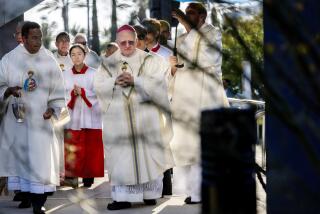Measured Approach Channels Her Anger
The tone in Joelle Casteix’s voice is melodious, unthreatening. She could just as easily be describing a vacation or a fun night out.
Far from it. She’s talking about the endgame in what has become the fight of her life -- calling Orange County Catholic diocesan officials to account for sexual abuse and cover-ups over the last generation. If her voice is honey-coated, the words are anything but.
So while diocesan officials and their insurance representatives continue to meet behind closed doors with victims’ attorneys in pursuit of a settlement that could run into the tens of millions of dollars, the 33-year-old Casteix waits at her Corona del Mar home. She gets limited briefings from her attorney, but she’s decided she’ll accept only one outcome: a release of all documents detailing abuse and the diocese’s reaction to it.
She realizes that may not be part of a settlement. If not, she says, she won’t accept a dime -- even if that separates her from any or all of the other 100 or so plaintiffs and means she’ll file a separate lawsuit.
To my mind, the image of church officials negotiating financial settlements -- just as an irresponsible corporate giant would after a scandal -- is unsavory. But it is a moment of the church’s own making, and if the diocese mimics the pattern of other corporate wrongdoers, it will lobby hard that the most incriminating records be sealed as part of any settlement.
“I think every single [abuse] survivor wants all the documents released,” Casteix says, “but a lot of them don’t have the strength to carry on that fight. It’s hard to file a lawsuit. The diocese loves to say we’re just in it for the money. This is no easy way to make money, let me tell you. We’ve all been put through the wringer a million times.”
I ask diocesan spokesman Father Joe Fenton if making the records public is on the negotiating table. “Joelle is the only one who is interested in releasing them,” he says, “so I don’t know what their status is.”
Casteix says the files would shock even the staunchest church supporter. Fenton says he’s not at all sure they would show that. “The vast majority of Catholics in the diocese want a just and prompt and compassionate settlement of this situation,” Fenton says. “And they want to go on with the building up of the kingdom of God as Catholics in Orange County. And we want to heal those people who have been deeply hurt.”
Casteix, who says she was sexually abused by a faculty member at Mater Dei High School between 1986 and 1988 that left her with a venereal disease and pregnant, long ago quit believing the diocese’s expressions of compassion. She is no longer a practicing Catholic.
She uses words like “dirty” and “evil” to describe the church hierarchy. “I’m willing to go as far as it takes to make sure that every kid who’s at a Catholic Church in Orange County is safe,” she says. “And now, I’m not convinced of that.”
If the documents were made public, it would forever blunt the diocese’s ability to deny the scope of abuse or the cover-up, Casteix says. If the extent of the crimes had occurred at any other institution, she says, “it would be dismantled. Why should they get a free pass because they claim to be the hand of God on Earth?”
I remark on how measured her voice sounds, given her sentiments.
“I am angry,” she says, “but if I blow up, I give the church control. I’ve gone through 15 years of counseling, medications, therapy and working with family and friends to make sure I could be as whole a person as possible. I’m dealing with a very, very big adversary and can’t show any kind of weakness. It’s tough. I have horrible days. But it does nobody any good to fly off the handle, so I have to stay measured because I have to stay strong.”
*
Dana Parsons’ column appears Wednesdays, Fridays and Sundays. He can be reached at (714) 966-7821 or at dana.parsons@latimes.com. An archive of his recent columns is at www.latimes.com/parsons.


